Tales of Heresy Read online
THE HORUS HERESY
TALES OF HERESY
Edited by Nick Kyme & Lindsey Priestley
v1.2 (2011.11)
The Horus Heresy
It is a time of legend.
Mighty heroes battle for the right to rule the galaxy. The vast armies of the Emperor of Earth have conquered the galaxy in a Great Crusade - the myriad alien races have been smashed by the Emperor’s elite warriors and wiped from the face of history.
The dawn of a new age of supremacy for humanity beckons.
Gleaming citadels of marble and gold celebrate the many victories of the Emperor. Triumphs are raised on a million worlds to record the epic deeds of his most powerful and deadly warriors.
First and foremost amongst these are the primarchs, superheroic beings who have led the Emperor’s armies of Space Marines in victory after victory. They are unstoppable and magnificent, the pinnacle of the Emperor’s genetic experimentation. The Space Marines are the mightiest human warriors the galaxy has ever known, each capable of besting a hundred normal men or more in combat.
Organised into vast armies of tens of thousands called Legions, the Space Marines and their primarch leaders conquer the galaxy in the name of the Emperor.
Chief amongst the primarchs is Horus, called the Glorious, the Brightest Star, favourite of the Emperor, and like a son unto him. He is the Warmaster, the commander-in-chief of the Emperor’s military might, subjugator of a thousand worlds and conqueror of the galaxy. He is a warrior without peer, a diplomat supreme.
As the flames of war spread through the Imperium, mankind’s champions will all be put to the ultimate test.
CONTENTS
TALES OF HERESY
The Horus Heresy
CONTENTS
BLOOD GAMES
by Dan Abnett
WOLF AT THE DOOR
by Mike Lee
SCIONS OF THE STORM
by Anthony Reynolds
THE VOICE
by James Swallow
CALL OF THE LION
by Gav Thorpe
THE LAST CHURCH
by Graham McNeill
AFTER DESH’EA
by Matthew Farrer
BLOOD GAMES
Dan Abnett
quis custodiet ipsos custodes?
HE HAD BEEN circling for ten months. Ten months, and eighteen identities, most of them so authentic they had fooled Unified Biometric Verification. He’d faked out three blind trails to throw them off his scent, one into the Slovakian fiefs, one to Kaspia and the Nord Reaches, and the other a meandering route down through the Tirol to the Dolomite Shrines overlooking the Pit of Venezia. He’d overwintered in Boocuresd Hive, and crossed the Black Sea Basin by cargo spinner during the first week of ice-ebb. At Bilhorod, he had turned back on himself to lose an unwanted tail. He had spent three weeks hiding in a disused manufactory in Mesopotamia, preparing his next move.
Ten months; a little long for a blood game, but then he was playing it out carefully, synchronising his movements with global patterns, following trade routes, inter-provincial traffic and seasonal labour migrations. He was one hundred per cent certain they didn’t have an orbital grid fix for him, and he was fairly confident they didn’t even have an approximate. There’d been no one on his heels since Bilhorod.
He trekked up-country through Baluchistan, mostly on foot, sometimes stealing a lift on transports, and crossed the border into the Imperial Territory three hundred and three days after he had set out.
THE TOP OF the world had changed in ten months. An entire peak had disappeared from the blinding skyline, a gap at odds with his memories, nagging like a missing tooth. The high-altitude air smelled of pitch, molten alloys and shaved stone. Primarch Dorn’s warrior-engineers were crafting their poliorcetics, armouring the highest and most robust steeples of the Earth.
The smell of pitch, alloy and stone was the smell of approaching war. Its fragmented notes hung on the bright air of the old Himalazia.
THE SCENERY WAS so white it scorched his eyes, and he was glad of his glare-goggles. A few degrees below zero, the air was like glass, and the sun like a fusion torch in the blue sky. Perfect snows coated the peaks and the ascents, painfully white, achingly empty.
He had considered the south his best option, Kath Mandau and the towering central Precinct, but as he approached he realised how much things had changed. Security, which had never been less than rigorous, had cinched up as tight as a penitent’s cilice. The coming war had trebled the guards on the gates, quadrupled the gun-nests and automated weapon blisters, and multiplied the biometric sensors a hundredfold.
Vast workcrews of migrant labourers, serving the orders of the Masonic Guilds, had gathered around the Palace: their camps, their workings, their very bodies staining the high snows green and black and red like algae growth.
Security is tighter, but there are millions more faces to watch.
He observed the labour hosts for six days, eschewing his plans for the south and turning north instead, following the high pastures and walking trails over onto the plateau, keeping the toiling hosts in view. Constant streams flowed down the snowy valleys and passes from Kunlun: columns of fresh workers, and convoys of cargo and building materials from the Xizang mines. The columns looked like rivers of slow, dark meltwater, or racing black glaciers. Where the influx streams met the worker armies, temporary cities sprouted in the shadows of the immense walls, habitent towns and canvas metropoli, accommodating the migrants, corralling their pack animals and servitors, seeing to their needs of food and water and medicine. The unloaded materials: timber, pig alloy, mule steel, ores and ballast, stacked up around the camp cities like slag heaps. Hoist cranes and magnificent derricks lifted pallets of materials up over the walls. Horns snorted and echoed around the high valleys.
Sometimes, he just sat and looked at the Palace as if it was the most wonderful thing in creation. It probably wasn’t. There were undoubtedly feats of ancient, inhuman architecture on forgotten, scattered worlds that dwarfed it, or eclipsed it in stupendous scale or awe-inspiring scope. The architecture was not the point. It was the idea of the Palace that made it the most wonderful thing. It was the inner notion, the concept that it made flesh.
The Palace was vast, beautiful, the greatest mountain range on Terra refashioned into a residence and a capital, and now, belatedly, a fortress.
THE MISSING HIMALAZIAN peak had been levelled for building materials. The recognition of that feat made him smile. These days, the schemes of man were never modest.
ADOPTING RAGS AND dirty leg armour, he spent three days labouring with the genestock ogres from Nei Monggol. Nicknamed the migou, they slogged up and down the passes, carrying sheets of zurlite and huge panniers of nephrite and Egyptian pebble. They dug embankments and earthworks with massive shovels made from the blade-bones of giant grox, and formed hammer gangs to rhythmically sink the iron stakes that would support the concertinaed spools of flay-wire.
At night, in the work camps, the massive gene-stock stoked their over-muscled bodies with qash, a resin derived from the venom of a Gobi Waste nematode. The substance made their veins bulge, and their eyes roll white. It made them speak in tongues.
He watched the effects, and made estimates of dosage and systemic duration.
The genestock were prepared to work with him, but they treated him with general suspicion. He tried to be just another Caucasian broadback, keen to earn a stipend and a bonus from the Masonic Guilds. His papers were in order. When he tried to purchase a little qash, however, they turned sour, fearing him to be a genewhip sent into the camps to keep the workforce clean.
They tried to kill him.
Under the pretence of a quiet sa
le, three genestock migou drew him apart from the main camp, and led him to a rock pasture where fire stone and cacho-long spoil had been heaped up by porter gangs. They unwrapped a cloth roll with slices of brown resin in it to show him. Then one drew a punch-dagger and tried to insert it into his liver.
He sighed – a complication.
He took hold of the migou’s wrist, folded the arm around and broke it against itself with his elbow. The joint went the wrong way, and the arm went so slack, he simply peeled the punch-dagger out of the dead fingers. The genestock uttered no expression of pain. He simply blinked in surprise.
All three of them were titanic creatures, corded and slabby with unnatural, hard-cut muscle definition. It had not occurred to any of them that the Caucasian, though extremely large and well made, would offer them a moment’s problem.
One threw a punch, a blow driven with huge force but desultory effort, as if he was aggrieved that they should be put to such trouble.
The punch was designed to finish matters, to put the Caucasian down, his jaw pulped, his head slack on the column of his spine.
The blow did not connect with any part of the Caucasian. Instead, it encountered the punch-dagger, which had suddenly been angled to face it. The impact shaved flesh and muscle away from bone. This produced a pain response. The genestock howled, and tried to gather in his shredded hand and forearm. The Caucasian shut him up by jabbing the punch-dagger into his heavy forehead. It cracked in through the bone like the tip of a rock-breaker’s pick.
The genestock toppled backwards, wearing the grip of the punch-dagger above his eyes like some curious tiara.
The third migou grabbed him from behind in an ursine hug. The genestock with the broken arm tried to claw at his face. It was all tiresome now. He broke free of the embrace with a shrug of his shoulders, turned and drove his right hand into the genestock’s chest.
The sternum split. When the Caucasian wrenched his hand out again, it looked as if it was wearing a red glove. Most of the migou’s heart was clenched in his steaming fist.
The genestock with the broken arm, now the only one of the trio left alive, murmured in fear and started to run away across the rock pasture.
He bore the wounded genestock no especial malice, but he couldn’t let him go. With bloody fingers, he bent down, selected a small piece of fire stone, weighed it in his hand and launched it with a snap of his wrist.
It made a pokkl noise as it penetrated the back of the fleeing ogre’s head like a bullet. He fell heavily, and his hefty corpse slithered down the litter of a spoil heap on its face.
He disposed of the three bodies in a fathomless gorge, washed his hands with snow and took the roll of qash resin.
THE CONFLUENCE OF workers gathered around the skirts of the Palace had brought, as any great body of humanity always did, lice and vermin and scavengers with it. Rad-wolves had followed the workers down off the plateau, and gathered at night, red eyes in the dark catching the flicker of the campfire rings. Thousands of war hounds patrolled the camp perimeters at night, or lingered on the escarpments before the Palace. The night was regularly interrupted by sudden gales of howling and barking, the growl and shiver of animals mauling one another as the faithful hounds drove off wolves that had become too inquisitive.
In the darkness, it was hard to tell the difference between hounds and wolves.
HE HAD RECEIVED regular physiological testing his entire life, and he had memorised all the results in forensic detail so as to best judge his limitations.
He cut the qash resin into sample measures, weighing each on a set of fine scales that he’d borrowed from a gem cutter.
The reinforcement of the Annapuma Gate was half done. Every day, the mouth of the huge gate bustled with thousands of labourers, and the towering hoist cranes swung cradles of ceramite plating, rebar and reinforced rockcrete up over the cyclopean arch. It was too intensive a task for the sentries to scan each labourer in and out individually: the labour gangs would snarl up, and the work would run slow. Instead, the entire gate zone was covered by a biometric reader field, projected by slowly rotating vanes in the eaves of the primary arch.
At dawn, he secured himself under the tarps of one of the payloads due to be taken in over the gate by hoist crane. He huddled down between sheets of mule steel and bundles of ironwood.
He had prepared a four-gram dose of qash, an overdose by migou standards. Its efficacy was such, he would be insensible less than a minute after ingesting it.
He waited for two hours until he felt the jolt of the lift crews securing the payload’s chains. He heard the steel cables of the hoist crane whining. He felt the heavy sway as the pallet he was hiding on left the ground.
He swallowed the qash.
Observation had shown him that it took the hoist crane mechanism forty-three seconds to bring a pay-load up to clearance height, and a further sixty-six seconds to traverse it in over the gate top. Twenty-four seconds into that second time period, the moving pay-load would enter the biometric reader field.
The qash did its work. He was stiff and dead twelve seconds before he entered the field. The field read nothing except a payload of inert building materials.
HE WOKE. THE pallet had set down, and some of the tarps had been pulled back. Riggers and roof-gangers were beginning to unload the mule steel.
His body ached. Most of his muscles were cramping. He focused and performed some purging exercises to throw off the vestiges of the somatic rigour that the qash had induced. Death to most mortal men, near-death to a being like him; a brief, death-like fugue to allow him to slip in through the Palace biometrics.
He slid off the pallet, sore and woozy. Enormous gunboxes and shielded fighting platforms were being constructed around the upper ramparts, and thick dura-plating and adamantium were being bonded to the walls. Workers milled around on scaffolds and gantries, some suspended like mountaineers over the edge of the wall’s sheer drop. The air was filled with noises of hammering and cutting.
Powered tools shrilled. Fusion torches buzzed and flickered with arctic blue light.
Phantoms fought behind his eyes, the ghost flares of fusion cutters. There was blood in his throat. He scooped up a box of rivets and a concussion mallet, and blended with the workforce.
HE PENETRATED THE outer levels of the Palace. This process took a further three days. He stopped being a masonic labourer and became a shadow, then a footman polishing brasswork, then a lamp-lighter with a spark-pole, and then a doorkeeper, wearing a livery he had purloined from a laundry room and a concealed displacer field to disguise his height and bulk.
He followed hallways that were dressed in diaspore and agate, and descended stairwells planed from solid pieces of onyx. He watched his reflection cross polished marble floors, and his shadow chase along walls carved from quartz and sardonyx. He waited in the ivory gloom of huge processionals while warbands passed by in marching time. He lingered in doorways while almost endless trains of servitors brought past trays of raw meats and hydroponic vegetables for the high table.
He became a footman again, then a carpet beater, then a beadle, and then a messenger man with an attaché box full of blank papers, hunching to disguise his build and height. Every once in a while, he stopped to get his bearings. The Palace was bigger than many cities. Its levels and byways took a lifetime to learn. From the rails of high balconies, he looked down into artificial ravines five hundred storeys deep, filled with lights and teeming with people. Some of the great domes in the Precinct, especially the Hegemon, were so vast, they contained their own miniature weather systems. Microclimate clouds drifted under painted vaults. Rain in the Hegemon was said to be a portent of good fortune.
As far as he knew, it had not rained in the Hegemon for three years.
THE CUSTODES WERE abroad, watching over the inner reaches of the Precinct, majestic in their ornate golden armour. Their plume crests were crimson, like sprays of arterial blood frozen in the air. The pre-Unity symbol of the lightning bolt was b
lazoned on their armour. They lurked in the gloomy halls and shadowed cloisters of the Palace, their Guardian spears upright, frighteningly vigilant.
They were impassive, silent, and they guarded their secrets solemnly, but in their very presence there was a truth to be unpicked.
He noted their deployment. Two custodes were watching the Southern Circuit that snaked like silver braid towards the Hegemon. Two more stood at the Jade Bailey, and another three patrolled beneath the fretted ironwork and malachite of the Congressional. A lone custodes, almost invisible, held position under the waxy emerald leaves of the Qokang Oasis, watching the outfall of the crystal-clear pleasure lake thunder down into the turbine gulf in misty cascades. Four more prowled the upper platforms of the Taxonomic Towers.
There were, however, none on the Northern Circuit, and none on the western limits of the lake, and none near the Investiary. It was so telling. They were like visible moons betraying the position of an invisible planet, bright astral bodies pushed into a certain pattern by the gravitational ministrations of an unseen star. By noting where they were, and where they weren’t, he could determine the location of his prey.
The Hall of Leng seemed most likely. From the disposition of the steadfast custodes, his prey had to be somewhere in the western hemispheric portion of the Precinct, which meant the Hall of Leng, the House of Weapons, the Great Observatory, or the private apartments adjoining the latter two, but he knew the Hall of Leng was a favourite place. When he wasn’t sequestered in secret toil in the deep, private crypts of the Palace, his prey was known to spend a great deal of time in the Hall, measuring the angles of space and time.
It was said that past and future co-mingled at that site, and had done so since primordial times, before the place had owned the name Leng, before his prey had been born, before a roof had been raised above it, or human eyes had seen it. The Hall of Leng, long-beamed and dark, was simply a domestication of one of the materium’s anomalies, a pulled thread in the fabric of time, a scab on the skin of space.

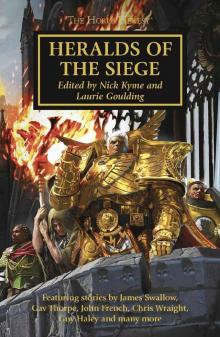 Heralds of the Siege
Heralds of the Siege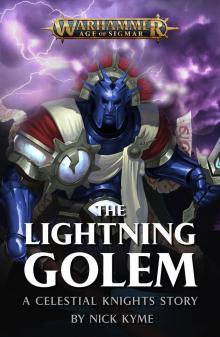 The Lightning Golem
The Lightning Golem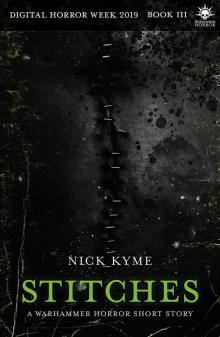 Stitches
Stitches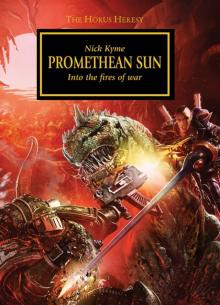 Promethean Sun
Promethean Sun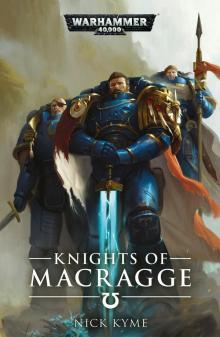 KNIGHTS OF MACRAGGE
KNIGHTS OF MACRAGGE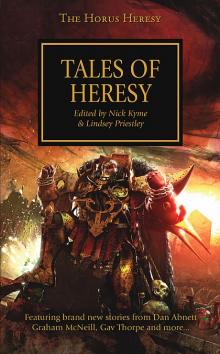 Tales of Heresy
Tales of Heresy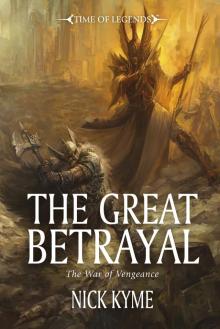 The Great Betrayal
The Great Betrayal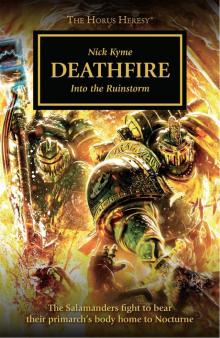 Deathfire
Deathfire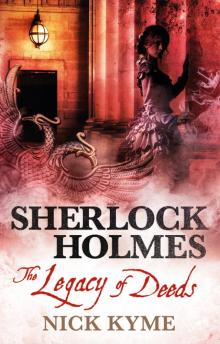 Sherlock Holmes--The Legacy of Deeds
Sherlock Holmes--The Legacy of Deeds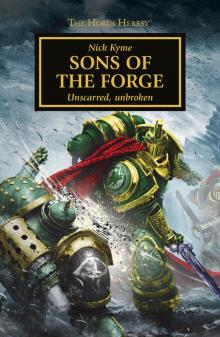 Sons of the Forge
Sons of the Forge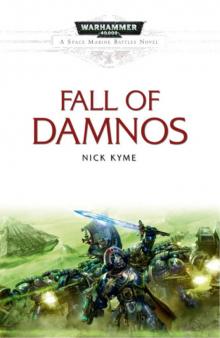 Fall of Damnos
Fall of Damnos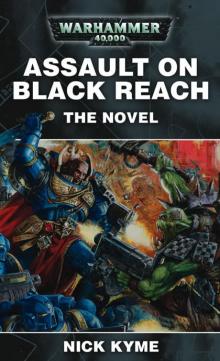 Assault on Black Reach: The Novel
Assault on Black Reach: The Novel![[Horus Heresy 10] - Tales of Heresy Read online](http://i1.bookreadfree.com/i/03/27/horus_heresy_10_-_tales_of_heresy_preview.jpg) [Horus Heresy 10] - Tales of Heresy
[Horus Heresy 10] - Tales of Heresy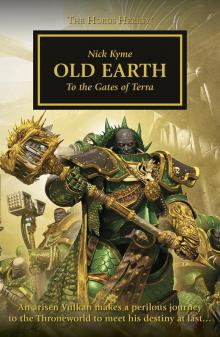 Old Earth
Old Earth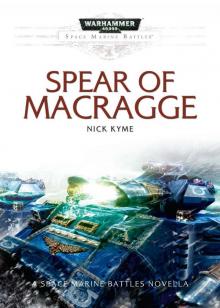 Spear of Macragge
Spear of Macragge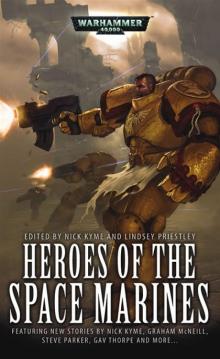 Heroes of the Space Marines
Heroes of the Space Marines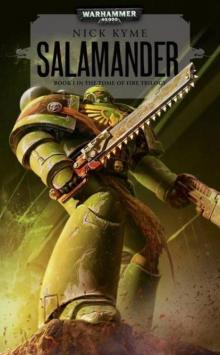 Salamander (warhammer 40000)
Salamander (warhammer 40000)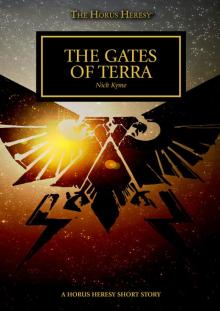 The Gates of Terra
The Gates of Terra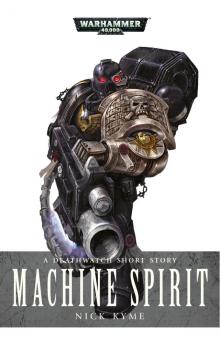 Machine Spirit
Machine Spirit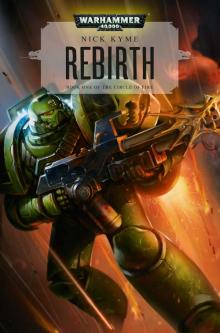 Salamanders: Rebirth
Salamanders: Rebirth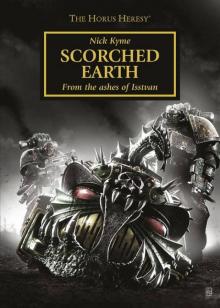 Scorched Earth
Scorched Earth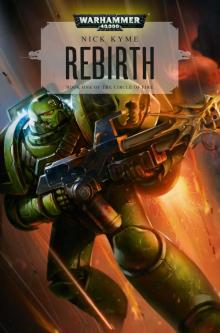 Rebirth
Rebirth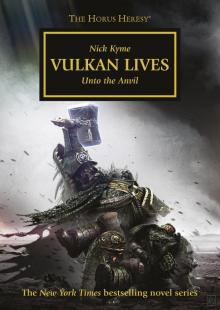 Vulkan Lives
Vulkan Lives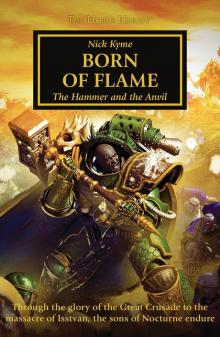 Born of Flame
Born of Flame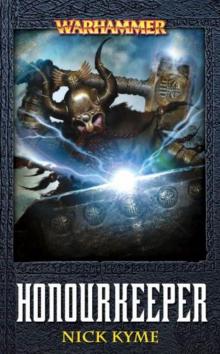 Honourkeeper
Honourkeeper